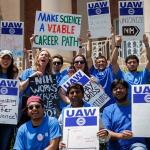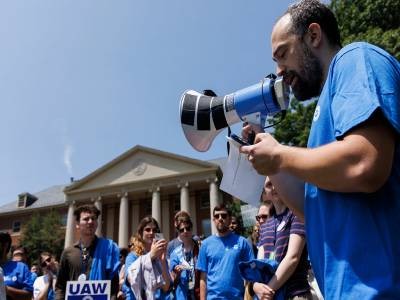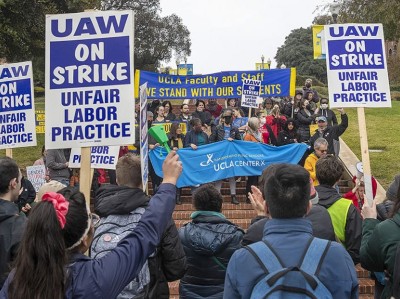NIH Researchers Vote To Form a Union for the First Time

Hundreds of early-career researchers at the US National Institutes of Health (NIH) have voted overwhelmingly to form a union, nearly completing the official process required to do so. They plan to call on the agency — the world’s largest public funder of biomedical research — to improve pay and working conditions, and to bolster its policies and procedures for dealing with harassment and excessive workloads.
Thousands of early-career NIH researchers forming union for first time
About 98% of the research fellows who participated in the ballot voted on 6 December to form the union, with 1,601 voting in favour and just 36 against. Barring any objections, the result will be certified by the US Federal Labor Relations Authority (FLRA) after five business days, and the union will become the first ever to represent fellows at a federal research agency and the largest union to form in the US government in more than a decade.
The result could have implications for early-career researchers at other institutions, because universities look to the NIH for research standards and pay scales, says Rosa Lafer-Sousa, a postdoctoral fellow and neuroscientist at the National Institute of Mental Health, one of the NIH’s units in Bethesda, Maryland. “Any wins that we make will improve the working conditions for researchers across the country,” she says.
In a statement to Nature, the NIH says the agency respects the “decision made by the employees to form a union”. In late July, the agency asserted that its research fellows weren’t employees, meaning they were ineligible for unionization, but withdrew the objection within days, according to reporting by Science.
Part of a trend
The mobilization of fellows at the NIH comes amid a wave of union formation at universities across the United States, with graduate students and academic workers citing pay that has failed to keep up with the rising cost of living and subpar working conditions. “This is part of a larger trend of highly educated professionals, especially younger ones, turning to unionization to address their workplace concerns,” says Ruth Milkman, a sociologist of labour at the City University of New York School of Labor and Urban Studies. As academia becomes more competitive and salaries fail to keep pace with economic conditions, this trend is “likely to continue”, she says.
The union, called NIH Fellows United, includes more than 5,000 research fellows, such as graduate students and postdocs, who hold non-permanent staff positions at the agency’s 27 institutes and centres. According to the NIH, that’s about 10% of the agency’s full-time workforce — although the calculation doesn’t include some fellows that the agency considers to be contractors, rather than employees. Fellows kicked off their effort to form a union on 1 June, when more than 100 researchers rallied on the NIH’s campus in Bethesda to celebrate filing their petition with the FLRA.
Historic US research strike ends — but energizes a movement
Unlike researchers working for the University of California system, who organized the largest higher-education strike in US history in late 2022, federal union members are not permitted to walk off the job in a similar fashion to demand improved benefits. They also do not have direct bargaining power over salaries or budget set by the US Congress, but they can push for legislation that would increase wages, says Kate Bronfenbrenner, director of labour education research at the Cornell University School of Industrial and Labor Relations in Ithaca, New York.
Once the union is official, members will elect a bargaining committee and submit their preferences for what the body should prioritize in its conversations with NIH administrators. Lafer-Sousa hopes that the union will prioritize longer-term appointments for international researchers, many of whom must return to their home countries once a year to seek visa renewals, which can delay their research.
Once the union is certified, the NIH will “engage in meaningful discussions with union representatives to better understand their members’ needs and aspirations”, a spokesperson for the agency says.
UPDATES & CORRECTIONS
-
Update 08 December 2023: This story was updated to include comments from the US National Institutes of Health.
-
Correction 08 December 2023: In an earlier version of this story, it said that the NIH asserted that its research fellows weren’t employees, and therefore ineligible for unionization, in August. It was in late July.


